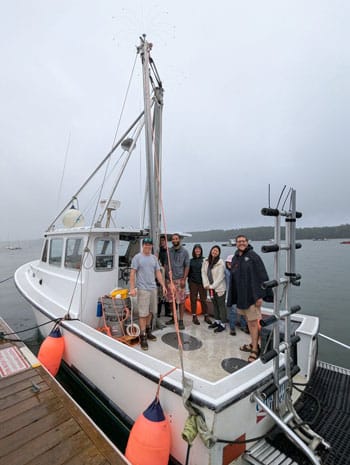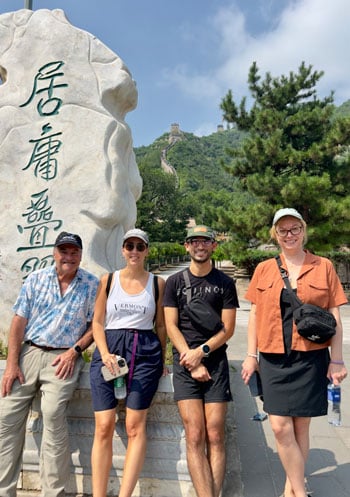This summer, Vermont Law and Graduate School students took their environmental learning into the field by traveling off campus to dive into coastal resources issues in Maine and explore environmental law and policy challenges in China.
An Immersive Experience in Maine
Six students took part in the Maine field study course, Balancing Coastal Resources, taught by alums Benjamin Leoni JD’11 and Lindsay Leoni Bourgoine MELP’15. While in Maine, Alex Simoneau MFALP’24, Devin Brennan JD/MAPP’25, Danielle Brodsky MPP’25, Carlton Bottenbley JD/MERL’26, Kaya Mark JD/MCEP’26, and Aika Mitchell JD/MAPP’26, interacted with community leaders at the forefront of critical issues.
The field study course “gives students a firsthand experience with the scientists, lawyers, fishermen, and policymakers who exist at the frontlines of coastal resources law and policies,” Leoni explained. “It’s one thing to read a court decision in a textbook. It’s another to witness the emotional toll that same decision has on the face of a fisherman or on the scientist who has dedicated their life to studying a species on the brink of extinction. The goal of this course is to immerse students in both the ideas and actual day-to-day lives of stakeholders directly affected by policies concerning coastal resources. From collecting zooplankton with Bigelow Laboratory scientists by boat to guest lectures from fishermen and offshore wind advocates and opponents, this class immerses students in the economic, emotional, and legal realities of court decisions and legislation.”

Mark described the field study as an opportunity to learn more about the laws and policies discussed in class and how they apply in specific communities. “My favorite part of the course was getting to visit a local oyster farmer’s oyster beds out on the water and hearing about the struggles he faces in the industry,” Mark said. “In addition, learning about the competing interests of locals from different industries like fishing, lobstering, conservation, clean energy, and government, and how environmentalism really encompasses so much, was an incredible experience. It also helped that we were in beautiful Maine for two weeks! I saw puffins, dolphins, porpoises, and even a shark!”
“To be a good advocate, you need to both listen to and truly understand the viewpoints and interests of the other stakeholders in the room. We want the experience to show students that law and policy are not developed in a vacuum,” Leoni added.
Gaining Cultural Understanding in China
The Environmental Governance Field Study traveled to China. Led by Robert Percival, director of the Environmental Law Program and Robert F. Stanton Professor of Law at the University of Maryland Francis King Carey School of Law, this course allowed the students to observe firsthand the process and the challenges of implementing strong environmental governance in China.
For the students, Leyna Schaeffer MCEP’24, Adam Gonzales JD’25, and Michelle Medina-Bennett JD’25, the field study trip was an opportunity to see their classroom knowledge come to life. They observed environmental governance in action and engaged directly with local people about the issues they are facing.
“The people were so friendly in all the cities we visited—Beijing, Xi’an, Suzhou, Wuxi, Hangzhou, and Shanghai,” said Medina-Bennett. “As we traveled, I was impressed with the number of transmission lines, but I was concerned about smokestacks and nuclear power plants being located close to or in the middle of neighborhoods. I was also concerned by the smog. Some mornings I thought it was fog, but after it failed to dissipate, I realized it was pollution. There were days with clear blue skies, but there were more days when the sun was completely obscured.”

“I also studied Chinese law in the Transnational Environmental Law Clinic. As the second most populated nation in the world, I can see why they do things differently, but touring China helped me understand their laws and customs,” said Schaeffer. “While in China, I was immersed in its beautiful culture and gained the deepest respect. I loved waking up to fresh hot noodles, broth, and healthy green vegetables, and I look forward to returning soon. It has changed the way that I want to live and make choices for myself. I am deeply grateful for this experience.”
More Opportunities for Experiential Learning
VLGS environmental field study courses are offered through the Tuholske Institute for Environmental Field Studies. The Environmental Law Center established this program to give students the chance to travel and experience educational opportunities that will give them the knowledge needed to advance environmental protection and justice. Through these environmental field courses, students diversify their learning experience through exposure to different landscapes and practitioner perspectives, gain cultural competence and understanding of racial and socioeconomic disparities, and receive hands-on training in environmental and natural resources issues.